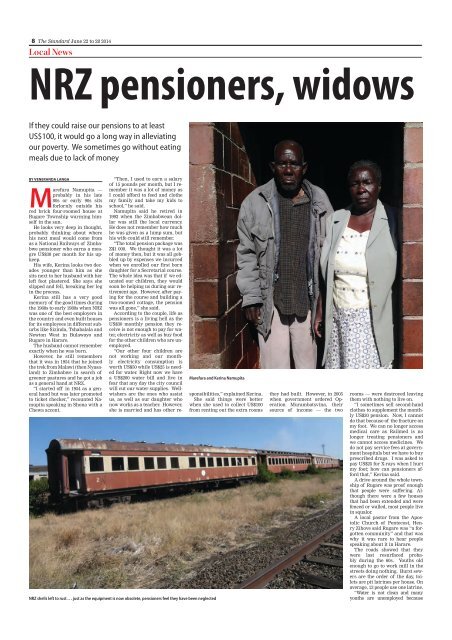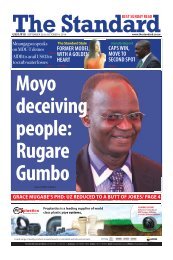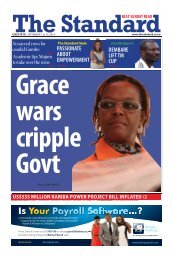The Standard 22 June 2014
You also want an ePaper? Increase the reach of your titles
YUMPU automatically turns print PDFs into web optimized ePapers that Google loves.
8 <strong>The</strong> <strong>Standard</strong> <strong>June</strong> <strong>22</strong> to 28 <strong>2014</strong><br />
Local News<br />
NRZ pensioners, widows<br />
If they could raise our pensions to at least<br />
US$100, it would go a long way in alleviating<br />
our poverty. We sometimes go without eating<br />
meals due to lack of money<br />
By VENERANDA LANGA<br />
Marefura Namupita —<br />
probably in his late<br />
80s or early 90s sits<br />
forlornly outside his<br />
red brick four-roomed house at<br />
Rugare Township warming himself<br />
in the sun.<br />
He looks very deep in thought,<br />
probably thinking about where<br />
his next meal would come from<br />
as a National Railways of Zimbabwe<br />
pensioner who earns a meagre<br />
US$30 per month for his upkeep.<br />
His wife, Kerina looks two decades<br />
younger than him as she<br />
sits next to her husband with her<br />
left foot plastered. She says she<br />
slipped and fell, breaking her leg<br />
in the process.<br />
Kerina still has a very good<br />
memory of the good times during<br />
the 1960s to early 1980s when NRZ<br />
was one of the best employers in<br />
the country and even built houses<br />
for its employees in different suburbs<br />
like Sizinda, Tshabalala and<br />
Newton West in Bulawayo and<br />
Rugare in Harare.<br />
<strong>The</strong> husband cannot remember<br />
exactly when he was born.<br />
However, he still remembers<br />
that it was in 1954 that he joined<br />
the trek from Malawi (then Nyasaland)<br />
to Zimbabwe in search of<br />
greener pastures and he got a job<br />
as a general hand at NRZ.<br />
“I started off in 1954 as a general<br />
hand but was later promoted<br />
to ticket checker,” recounted Namupita<br />
speaking in Shona with a<br />
Chewa accent.<br />
NRZ shells left to rust . . . just as the equipment is now obsolete, pensioners feel they have been neglected<br />
Marefura and Kerina Namupita<br />
“<strong>The</strong>n, I used to earn a salary<br />
of 15 pounds per month, but I remember<br />
it was a lot of money as<br />
I could afford to feed and clothe<br />
my family and take my kids to<br />
school,” he said.<br />
Namupita said he retired in<br />
1992 when the Zimbabwean dollar<br />
was still the local currency.<br />
He does not remember how much<br />
he was given as a lump sum, but<br />
his wife could still remember.<br />
“<strong>The</strong> total pension package was<br />
Z$1 000. We thought it was a lot<br />
of money then, but it was all gobbled<br />
up by expenses we incurred<br />
when we enrolled our first born<br />
daughter for a Secretarial course.<br />
<strong>The</strong> whole idea was that if we educated<br />
our children, they would<br />
soon be helping us during our retirement<br />
age. However, after paying<br />
for the course and building a<br />
two-roomed cottage, the pension<br />
was all gone,” she said.<br />
According to the couple, life as<br />
pensioners is a living hell as the<br />
US$30 monthly pension they receive<br />
is not enough to pay for water,<br />
electricity as well as buy food<br />
for the other children who are unemployed.<br />
“Our other four children are<br />
not working and our monthly<br />
electricity consumption is<br />
worth US$50 while US$25 is needed<br />
for water. Right now we have<br />
a US$200 water bill and live in<br />
fear that any day the city council<br />
will cut our water supplies. Wellwishers<br />
are the ones who assist<br />
us, as well as our daughter who<br />
now works as a teacher. However,<br />
she is married and has other responsibilities,”<br />
explained Kerina.<br />
She said things were better<br />
when she used to collect US$100<br />
from renting out the extra rooms<br />
they had built. However, in 2005<br />
when government ordered Operation<br />
Murambatsvina, their<br />
source of income — the two<br />
rooms — were destroyed leaving<br />
them with nothing to live on.<br />
“I sometimes sell second-hand<br />
clothes to supplement the monthly<br />
US$30 pension. Now, I cannot<br />
do that because of the fracture on<br />
my foot. We can no longer access<br />
medical care as Railmed is no<br />
longer treating pensioners and<br />
we cannot access medicines. We<br />
do not pay service fees at government<br />
hospitals but we have to buy<br />
prescribed drugs. I was asked to<br />
pay US$25 for X-rays when I hurt<br />
my foot; how can pensioners afford<br />
that,” Kerina said.<br />
A drive around the whole township<br />
of Rugare was proof enough<br />
that people were suffering. Although<br />
there were a few houses<br />
that had been extended and were<br />
fenced or walled, most people live<br />
in squalor.<br />
A local pastor from the Apostolic<br />
Church of Pentecost, Henry<br />
Zihove said Rugare was “a forgotten<br />
community” and that was<br />
why it was rare to hear people<br />
speaking about it in Harare.<br />
<strong>The</strong> roads showed that they<br />
were last resurfaced probably<br />
during the 60s. Youths old<br />
enough to go to work mill in the<br />
streets doing nothing. Burst sewers<br />
are the order of the day, toilets<br />
are pit latrines per house. On<br />
average, 13 people use one latrine.<br />
“Water is not clean and many<br />
youths are unemployed because


















